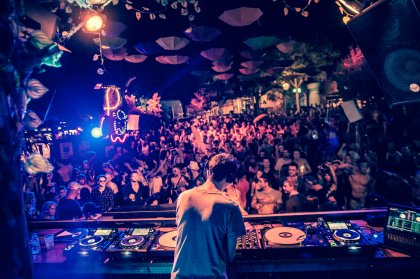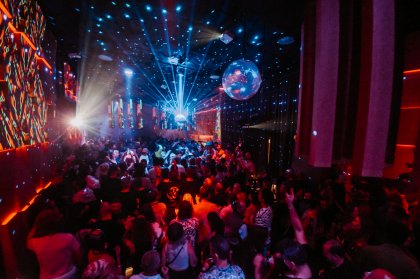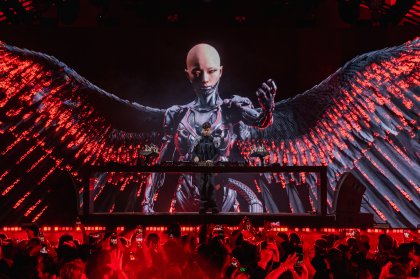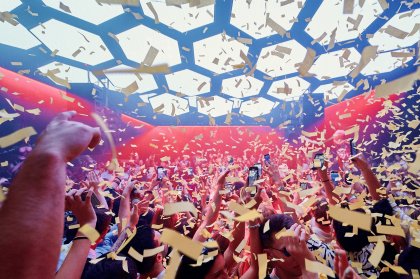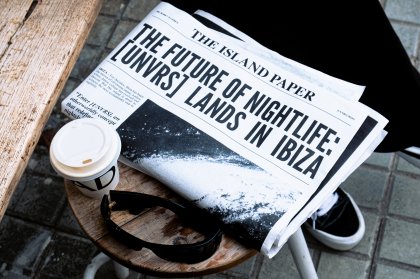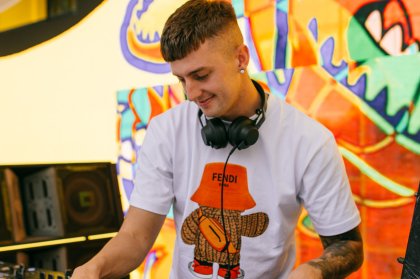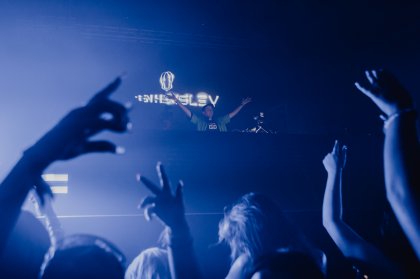2020 Vision is a label which forms strong relationships and values commitment. If an artist is loyal they are rewarded with the focus and best efforts of an imprint that has made it to twenty years (and counting) - no small feat in the increasingly fickle music business. The label survived the nearly insurmountable hurdle of the Internet explosion – at a time when collapse of the music industry as we know it was perceived as a real possibility. In a way, that collapse happened and, as 2020Vision founder Ralph Lawson puts it, nowadays you're the bad guy if you ask people to pay for music.
From casual beginnings in a farm house in Leeds, 2020 grew to become a launching pad for some of the biggest house producers and DJs today – though Lawson admits there are artists he wishes he could have not merely launched, but kept in the 2020 family. 2020 Vision plays the long game in a transient, quick-fix world and whilst it might not always be the best business decision in the short term, persistence and quality control pays off.
In interview, Lawson proved to be an interesting and considered man with a helpful explanatory analogy to illustrate almost every point; should have been science teacher. Lawson is influenced greatly by Ibiza and continues to be an influence here himself, giving Spotlight the exclusive scoop on his 2014 Ibiza plans including a 2020Vision takeover of Zoo Project and a debut set at Circo Loco (but more of that later)…
An insight into the 2020 Vision ethos and how it all runs:
This year you celebrate 20 years of 2020 vision. You're doing stacks of interviews, parties and have a big compilation coming out on the 30th of June. Has all this extra attention on the label made you feel especially proud and reflective of what you've achieved?
"Definitely reflective, that's the word. Anniversaries are a really good time to take stock of your position and look at what you have done and where you're going, but for me it's not about pride. I think pride is a little bit foolish, it means you're resting on your laurels or patting yourself on the back. I never like to get complacent; I'm always looking forward, always striving for the label to be better and always trying to improve my skills as a DJ. History is important and you need to know where you've come from and what you've done, but only insofar as to say ‘those were great moments, those were not so great, we can improve this and let's move forward.' "
Is that why you've chosen only new releases for the Content anniversary compilation?
"Yeah. I've seen a lot of anniversary compilations for labels and the standard format is just to re-hash your back catalogue, which I think is kind of pointless and lazy. What we had here was the opportunity to do something special. I could approach a lot of artist that I wouldn't have been able to get on my label otherwise because they're either too big, or they've got their own thing or they're working on an album… but maybe they've got the time and they love the label enough just to give us one track, one slice of music. I mean you talk about pride on the label but I'm still building and it would be nice to look back later on and say I really got everyone I wanted - so this is my opportunity to get that all at once. We've got Matthew Herbert, Simian Mobile Disco, Eats Everything, Cassy, Matthias Tanzmann – all people I really wanted on the label and they love the label but are super busy with their own projects. And they all went for it! They showed respect and love, and delivered. So I'm really excited, I think we've managed to put something together that's worthy of the anniversary itself."
As you've grown as a label, and built a team around you, is it hard to let go of creative control when it comes to A&R?
"It can be! Eventually once I had my team it actually got to a point where I had to say, ‘I'm going to trust you on this one. I'm not totally sure, it's not quite my thing, but I understand where it's coming from and I'm going to let you run with it.' And I've only really come to that point I must say in the last year - it took me 19 years! Having said that, there's absolutely no way anything's going on the label without that quality and its integrity. I think you've got to open yourself up a little bit to style – styles change and they may not always be exactly your thing but what you cannot ever negotiate on is quality control, that has to be kept. As soon as you start dropping the quality control bar people notice and you're in trouble."
Music is obviously paramount, but a label is a business as well. Have you had moments when the business and creative interests conflict?
"Yeah it all happened at once. Basically we had an artist signed to us that had remix approval rights. We got remixes commissioned by Solomun, Jamie Jones, Wolf & Lamb and Julio Bashmore but all of the remixes got turned down. We're not saying we're so great, but we have to stick to our policy of ‘Music First'. So no matter how big the artist we're going to make a choice based on the music itself. Some really didn't understand that concept and got really pissed off, whereas a couple said “ok, let's try something else,” and we were more than happy for them to do that and put the second version out. Our accountant was cursing me as much as their managers, saying what the hell are you doing turning down the biggest DJs of the year (it was 2012)? But we're in the long-term game, we've set our stall up and if we've decided to only release the songs we are feeling, then we've got to live by that. You make your bed and you have to lie in it."
You said you like to take artists on board at 2020 for a long time, really build a relationship with them, is that correct?
"Yeah I've never been in the short-term game. I've been at Back to Basics, my residency in Leeds, for 20 years plus, I've run 2020Vision for 20 years plus…"
You're a sticker…
"Yeah I'm a sticker, absolutely. You set yourself off to a direction and you stick with it, you keep going. We've never signed the big one-hit wonder – novelty songs, flavour of the month acts – I avoid them like the plague. I get all those kind of demos and maybe I made some bad sales decisions but we're still here twenty years later so I think people are buying into our integrity and they're trusting us as a filter. Record labels are filters – they're basically muting the noise and letting you decide you're going to follow their direction. As soon as you lose people's trust they're going to stop following you, it's just like Twitter."
"So we're all about the long-term game, we're very good at finding new young acts early, it's one of our biggest skills. Look at Paul Woolford, Maya Jane Coles, Huxley, Motor City Drum Ensemble…we're really on it early. What's a little bit of a regret is you often can't keep these guys. They go off into the sunset really fast these days. We're really searching for new young artists to give us that kind of trust back. And finally it's started to happen with our latest new kid on the block, Citizen. When we got him no one had heard of him but within a year he's won best break through DJ at DJ Mag, his tracks are getting big and everyone knows him. But we got him at the right time and credit to his management they signed for two albums because they had the same long-term vision as us, and that's exactly where we want to be. So of course Citizen is going to get our focus and we're going to really push as hard as we can on that act because we've got a long-term deal to work to. It's a little bit like a relationship with a boy or a girl – at some point you've got to bring up the c-word, you've got to bring up a bit of commitment. Is this going to be a long-term thing and if it is I'm going to put more energy into it. It's as simple as that."
Has running a label changed the way you listen to music?
"Yeah it really has. And DJing especially has. There are only so many hours in the week and if you're going to be a professional DJ you're basically working every weekend and preparing every week. So with a busy life if you're running a label, you're in the studio, whatever you're doing outside the DJ aspect of your job, you're having to look for music, you're searching for hot fresh cuts to play at your gigs and that's nearly a full time job in itself. There are thousands of new releases, thousands of promos, tons of old vinyl to get through, there are edits to do…. It's a full time job if you want to go for it on a professional level. So there isn't a lot of time to listen to music recreationally. I'm spending my whole day preparing. listening to stuff that's going to fit into what I do as a DJ And I'm in a very specific niche as a DJ so I'm listening to a lot of the same sounds. So quite often I don't even listen to music because I've been listening professionally all day. But when I do I must admit Spotify has been an incredible way to browse and discover new music. When I do that I listen to basically anything other than house music. I'm really into dub reggae, funk and soul and that's what I go for mostly if I'm listening in my free time. It's a very different activity than constantly searching for the next track to play as a DJ."
Where 2020 sits in the changing industry:
If you compare 2020's latest compilation to the earlier releases, has the label's style changed much?
"I don't think the music has changed that much. For a lot of DJs it's cool to play old records, and they still sound really current, so I think house music as a format is still roughly the same. It's four-to-the-floor with those nice sharp hi hats, often vocal hooks, big bass lines with dubbed out drums and vocals… as a format it's still pretty similar. What's changed is that we have tons and tons of different types now. Before there was just house music and now we have this amazing myriad of different forms that each new producer or scene has brought to the table. The quality is better, the sound systems are better and there are more people into the scene… but what has really changed is the industry. When we started it was very much a kind of rough and ready DIY punk ethic. We'd set up where we could, people would get together, it was all pretty spur of the moment. Now we've got a developed scene, the club's are big business, DJs get paid a lot of money at the top, there are managers, agents… So the music industry is different but the music hasn't moved a million miles."
One of the changes in the industry is the fact that as soon as anyone gets any success and recognition in dance music, the immediate next step is to start their own label. Do you consider this a positive thing?
"That's a really good question and it's one I've been thinking about lately a lot. I've got two perspectives on it: from my DJ/artist background, I mean I was a DJ and I set up a label, so how can I talk against it? But from the label point of view, I have been working on this for twenty years and I know what work it took to change that idea of just throwing out some tracks into creating a proper professional label, with label managers, A&R, PR, good distribution, and an understanding of how to put a record out successfully, how to help manage artists and get them where they want to be. It's all part of the process now but we've learnt it all the hard way and grown from our mistakes. We are a record label, it's not just Ralph Lawson and friends, it's 2020vision. And the thing I find a little bit difficult recently is managers want what's best for their artists so they think about that first and foremost. Which means when they start their own label you're often forced into booking such-and-such and friends, instead of just having one happy family of our own artists. It's like football: you don't go and see Wayne Rooney and friends, you go and see Manchester United - the club will outlast the players…"
How easy was it as a label to survive the coming of the Internet? Because you were there during a time of big change…
"Yeah we were. It was the single hardest thing the music business has ever gone through in its 50-60 years of being a real industry. It's a very new industry, really. The Internet was its biggest challenge and it was unbelievably unprepared for it. Film has been lucky by learning from the music industry's mistakes, but no one in the music business was prepared. As soon as Napster came along, everyone's been on the back foot and its never really recovered because once a generation was able to get music for free, and felt that it was their right to get music for free it's almost as if you're the Big Bad Wolf for asking people to pay for their music."
"What's happened is that we've been pushed more and more into the world of live. Live music's great, don't get me wrong it's fantastic, but when someone goes and works so hard in the studio, it takes hours and hours and when they're not getting their fair royalty share of that they're getting deprived of a really important source of income – both artists and label – and it's not fair. Just imagine you're working at Tesco on the tills. You've worked all the hours through the week and at the end of the week the boss goes, ‘there's your pay check but if you don't mind I've given about half of it away to the people you were serving, they didn't want to pay for it.' You're not going to be very happy! And it's a similar thing for musicians. Everyone looks towards the superstars like they do footballers: they talk about how much money they're earning, how glamorous their lifestyles are but this is just a tiny percentage! There is a massive majority of working musicians that are not getting paid and are struggling to make ends meet and it's affecting the business. You're not getting some incredibly creative and brilliant music come through because it's getting pushed more and more to an all or nothing commercialism."
Ibiza and the 2020 parties:
How did the 2020Vision Day/Night party go in London last weekend?
"It was amazing and really heart-warming to have so many people come out for us. We hadn't done a day/night party for a while in London. We started them back in 2010 and did some infamous parties at Village Underground, The Loft and even took over Shoreditch Underground station but we hadn't done one for a couple of years so I wasn't sure if people remembered us. We sold out and were really lucky with the weather. We had Psychemagik, Greg Wilson, Citizen and PBR Streetgang. I recorded my session actually." [Listen below]
What makes the transition into day/night special?
"I definitely got my early day/night experiences in Ibiza. I was going to Space back in the day and DC10 when it was all about the daytime session and a special thing to have everyone dancing in the sun outdoors, as they were at the time. The way the party then progresses into night and darkness; the disco lights come on and people start to use their ears instead of their eyes, they re-adjust and get more tuned into the music. I love the sunset set where you play over that cross over. And people just love a day / night party."
Enlighten me on your Ibiza plans…
"Well we wanted to offer Ibiza Spotlight an exclusive - the big news for me is this summer I'm finally starting to play for Circo Loco at DC10. They are the club that's given me the most inspiration for 2020Vision over the years, so it's always been a real dream to play there. For me it's the Holy Grail – a massive thing and it's also my birthday so the best present in the world. We've also got a one-off dedicated Content day / night show at Zoo Project on the 5th of July with myself, Burnski, Dense & Pika Live, Acid Mondays and Tuccillo. So that's a big one for us. I'm also making my debut appearance at Ants on the 12th of July."
Content Album is out on the 30th of June.
Ralph Lawson Ibiza dates:
Ants at Ushuaïa on the 12th of July
Circo Loco at DC10 on the 22nd of September (birthday session!)
2020Vision Content Day/Night party for Zoo Project at Benimussa Park on the 5th of July.
